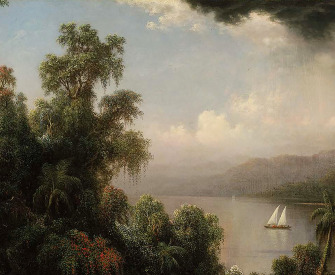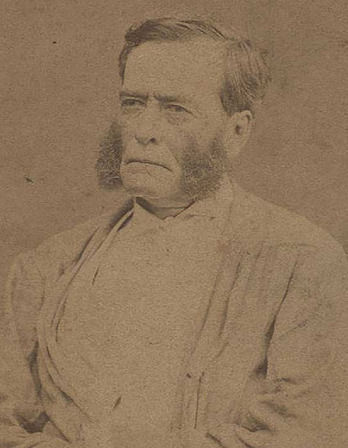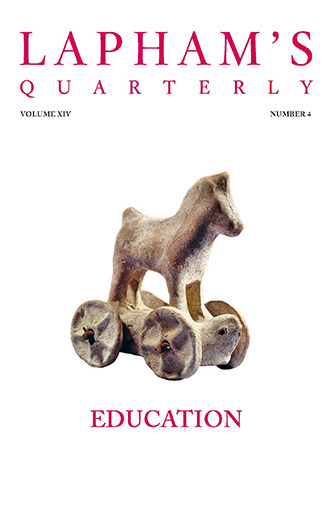Prospero: Come on,
We’ll visit Caliban, my slave, who never
Yields us kind answer.
Miranda: ’Tis a villain, sir,
I do not love to look on.
Prospero: But as ’tis
We cannot miss him. He does make our fire,
Fetch in our wood, and serves in offices
That profit us. What, ho! Slave! Caliban!
Thou earth, thou! Speak.
Caliban: [within] There’s wood enough within.
Prospero: Thou poisonous slave, got by the devil himself
Upon thy wicked dam, come forth.
[Enter Caliban.]
Caliban: As wicked dew as e’er my mother brushed
With raven’s feather from unwholesome fen
Drop on you both! A southwest blow on ye
And blister you all o’er!
Prospero: For this, be sure, tonight thou shalt have cramps,
Side-stitches that shall pen thy breath up; urchins
Shall, for that vast of night that they may work,
All exercise on thee; thou shalt be pinched
As thick as honeycomb, each pinch more stinging
Than bees that made ’em.
Caliban: I must eat my dinner.
This island’s mine by Sycorax my mother,
Which thou tak’st from me. When thou cam’st first
Thou strok’st me and made much of me; wouldst give me
Water with berries in’t, and teach me how
To name the bigger light, and how the less,
That burn by day and night. And then I loved thee
And showed thee all the qualities o’ th’ isle,
The fresh springs, brine pits, barren place and fertile:
Cursed be I that did so! All the charms
Of Sycorax—toads, beetles, bats—light on you!
For I am all the subjects that you have,
Which first was mine own king; and here you sty me
In this hard rock, whiles you do keep from me
The rest o’ th’ island.
Prospero: Thou most lying slave,
Whom stripes may move, not kindness! I have used thee,
Filth as thou art, with humane care, and lodged thee
In mine own cell, till thou didst seek to violate
The honor of my child.
Caliban: O ho, O ho! Would’t had been done.
Thou didst prevent me—I had peopled else
This isle with Calibans.
Miranda: Abhorred slave,
Which any print of goodness wilt not take,
Being capable of all ill! I pitied thee,
Took pains to make thee speak, taught thee each hour
One thing or other. When thou didst not, savage,
Know thine own meaning, but wouldst gabble like
A thing most brutish, I endowed thy purposes
With words that made them known. But thy vile race—
Though thou didst learn—had that in’t which good natures
Could not abide to be with; therefore wast thou
Deservedly confined into this rock,
Who hadst deserved more than a prison.
Caliban: You taught me language, and my profit on’t
Is, I know how to curse. The red plague rid you
For learning me your language!
Prospero: Hag-seed, hence!
Fetch us in fuel; and be quick, thou’rt best,
To answer other business. Shrug’st thou, malice?
If thou neglect’st, or dost unwillingly
What I command, I’ll rack thee with old cramps,
Fill all thy bones with aches, make thee roar,
That beasts shall tremble at thy din.
Caliban: No, pray thee.
[aside] I must obey; his art is of such power,
It would control my dam’s god Setebos,
And make a vassal of him.
Prospero: So, slave; hence!
[Exit Caliban.]
From The Tempest. Aldous Huxley took the name for his best-known novel from Miranda’s exclamation, “O, brave new world/That has such people in it!” and the popular phrase used to connote a large shift or metamorphosis derives from Ariel’s lines, “Nothing of him that doth fade,/But doth suffer a sea-change/Into something rich and strange.” It is thought that Shakespeare borrowed language from Michel de Montaigne’s essays “Of Cannibals” and “Of Cruelty” for speeches by Gonzalo and Prospero, respectively. The play’s first known staging was in 1611 for King James I.
Back to Issue





